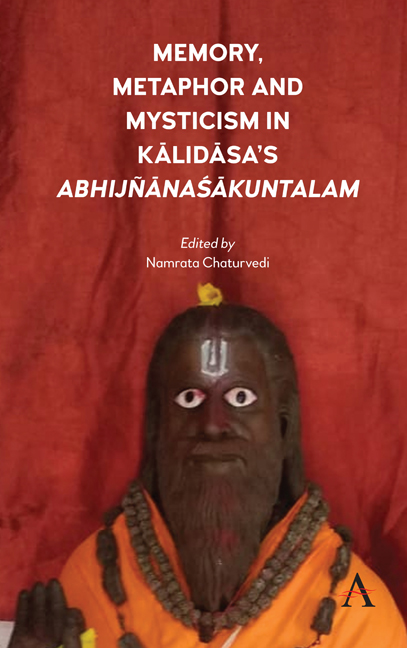Chapter 7 - The Seeker Finds His Self: Reading Sārārthadīpikā,the Advaita Commentary onAbhijñānaŚākuntalam
Published online by Cambridge University Press: 23 February 2022
Summary
One of the brilliant writers whose remarkablecontribution is engraved in golden letters in thehistory of world literature is Kālidāsa, and amonghis writings, AbhijñānaŚākuntalam is a masterpieceof dramatic excellence. His poetic genius is soprofound that all ancient Indian literary criticsworth the name have referred to him, and till datethere has been rarely any Sanskrit dramatist who canexcel him in the portrayal of subtle human emotions.For the standard he has set for literature, thescholars view him as one of the greatest playwrightsof the world. Extolling his eminence, Mammaṭa in hisKāvyaprakāśa saysthat the basic objectives of poetry is to earn fame(yaśas) and wealth,to know the ways of the world and so on, and thatKālidāsa is the one who has become a celebritybecause of his contribution to literature. BhīmasenaDīkṣita, in his Sudhāsāgara commentary on the Kāvyaprakāśa, furtherconcurs with this idea with an explanation that themain motive of Mammaṭa is to eulogize thecontribution of the poet who is famous exclusivelybecause of his own poetic merit and whose name andfame are not associated with any other factor likeforming a part of the storyline, as has happened inthe case of Vyāsa, or being endowed with divineaptitudes like that of Vālmīki. Kālidāsa's famerests only on his works. Many Western and Indianscholars have showered encomiums on Kālidāsaespecially for his AbhijñānaŚākuntalam.
Its skilful plot of love between two lovers followed bydisappointment and eventual fruition of union haslong delighted the audience, and this play has beentranslated into many languages, Indian and Western.Besides this, the dramatic plot of AbhijñānaŚākuntalam becamea model for the other writers during thepost-Kālidāsa period, and the style and dictionemployed therein were reverentially followed allalong.
- Type
- Chapter
- Information
- Memory, Metaphor and Mysticism in Kalidasas AbhijñnaŚkuntalam , pp. 137 - 152Publisher: Anthem PressPrint publication year: 2020



